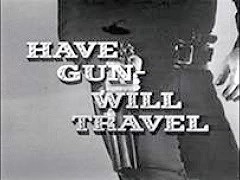
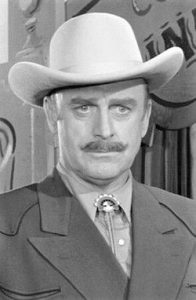 Have Gun–Will Travel (1958-60) aired “Helen of Abijinian” on January 4, 1959 as the show’s 7th episode out of what would be a total of 106 over its two year run. This is only the seventh episode we have shared of this much loved western, the first being in September of 2019, the second and third coming in March and October of 2020, the fourth and fifth in April and December of 2021, with the last shared in April of 2022. A recap of the backstory of the program is in order for newcomers.
Have Gun–Will Travel (1958-60) aired “Helen of Abijinian” on January 4, 1959 as the show’s 7th episode out of what would be a total of 106 over its two year run. This is only the seventh episode we have shared of this much loved western, the first being in September of 2019, the second and third coming in March and October of 2020, the fourth and fifth in April and December of 2021, with the last shared in April of 2022. A recap of the backstory of the program is in order for newcomers.
The very existence of the radio show is an odd duck, in that while not unique it was one of the very rare radio shows to be a spinoff of a successful tv show, which is backwards from the usual sequence of events, with the radio show coming first, then the tv show (for examples of the usual order, see Gunsmoke, Dragnet, and The Lone Ranger). In this case, Have Gun–Will Travel on television first aired in 1957 and its radio counterpart aired its first episode just over a year later in 1958. The original CBS tv series would run from September 1957 through April of 1963 and proved quite popular. Richard Boone (1917-1981) starred as Paladin, a cultured, educated, gun-for-hire living in San Francisco’s swanky Carlton Hotel during the period following the Civil War to approximately 1875 as a well-appointed man of wealth and sophistication, who earned his living by putting ads in local newspapers as a high-priced gunslinger with the simple calling card of “Have Gun–Will Travel.” While expensive to hire ($1,000 per day plus expenses) and ready, willing, and able to use his trademark gun when necessary, he often was a master at settling disputes or resolving issues in a diplomatic and bloodless manner.
 The term “paladin” itself has several meanings, among them “champion of the realm” or “trusted military leader” or even “a knight without armor in a savage land.” You get the idea. Paladin’s trademark is the iconic chess character of the knight, which he showcases on his signature black holster and on his business card. As backup to his handgun, Paladin also carried a double-barreled derringer behind his belt.
The term “paladin” itself has several meanings, among them “champion of the realm” or “trusted military leader” or even “a knight without armor in a savage land.” You get the idea. Paladin’s trademark is the iconic chess character of the knight, which he showcases on his signature black holster and on his business card. As backup to his handgun, Paladin also carried a double-barreled derringer behind his belt.
Famed radio director of such shows as Suspense, Escape, and later the popular tv westerns such as The Virginian and Gunsmoke, Norman Macdonnell championed the idea of spinning off a successful tv show to radio, and Have Gun–Will Travel on radio was born. One of my favorite radio and tv actors, John Dehner (1915-1992), was cast as radio’s Paladin, his resonating baritone perfect for the role. Dehner himself was in many ways like the character he played, for his father traveled a lot and Dehner went to school and was educated mostly in Europe (though he was born in New York). Along the way, he learned to speak four languages fluently and others to a lesser degree (including Norwegian, French, Spanish, Italian, Swedish, and even some Hopi Indian). In the early 1940s Dehner worked for Walt Disney Studios as an animator and did work for such iconic animated features as Fantasia (1940), Bambi (1942) and some Pluto, Donald Duck, and Mickey Mouse cartoons. After a stint in the Army during World War II he held jobs as a radio news editor and disc jockey, then graduated to numerous acting roles of various sizes, including, but not limited to shows such as The Hermit’s Cave (as host), and supporting roles in The Whistler, Gunsmoke, Suspense, Escape, Philip Marlowe, Frontier Gentleman (star), and the week following the demise of Frontier Gentleman, the star of Have Gun–Will Travel.
John Dehner’s television and film roles are far too many to list here, but he appeared in 125 feature films and shorts, and in well over another 100 tv roles from mystery to western to science fiction and is easily recognizable for his blue eyes, moustache, and again his iconc baritone that Radio Life Magazine said was the industry’s “best radio voice.” Of interest to SF fans, Dehner appeared three times on the original The Twilight Zone: in the first season as Captain Allenby in “The Lonely,” as engineer Alan Richards in “The Jungle” in its third season, and in its fifth and final season as Jared Garrity in “Mr. Garrity and the Graves.”
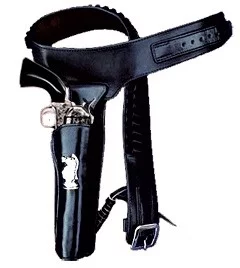 Of interest is that Norm Macdonnell was not only the champion of spinning off a radio program from its parent television show, but his idea to rewrite as closely as possible for radio the original tv scripts, thus, the initial 30 episodes of Have Gun were lifted from the already aired tv shows. [After that, Macdonnell would leave the show and go on to direct and write for television’s Gunsmoke, tv’s longest running (to that time, 1955-75) continuous prime time show in history.]
Of interest is that Norm Macdonnell was not only the champion of spinning off a radio program from its parent television show, but his idea to rewrite as closely as possible for radio the original tv scripts, thus, the initial 30 episodes of Have Gun were lifted from the already aired tv shows. [After that, Macdonnell would leave the show and go on to direct and write for television’s Gunsmoke, tv’s longest running (to that time, 1955-75) continuous prime time show in history.]
Last but not least, from an article in AVClub from 2014 by Brandon Nowalk titled “The Adult Western Peaked with Have Gun–Will Travel”: “…the adult Western, nominal or otherwise, is what TV audiences were looking for in the late ’50s. Have Gun – Will Travel wasn’t the first, it wasn’t the most popular, and it didn’t last the longest. But it was the best. Have Gun picked up the pieces of the adult Western and assembled them into something greater. There was Gunsmoke’s dramatic power, Earp’s pretension, and Cheyenne’s rootless energy. And where those others lost cast members, dipped in quality, or completely transformed, Have Gun stayed steady, a strong half-hour black-and-white adventure leading into Gunsmoke every Saturday night for six years.” Though it is true that Have Gun wasn’t the most popular show of its time, Nielsen ratings confirm that it ranked near the very top of the heap with a #3 or #4 rating for its first four years. (Gunsmoke would take top honors as the #1 show for four years, from 1958-61.)
This episode finds Paladin relaxing at his customary residence in the lobby of the Ritz Carlton Hotel in San Francisco, which also serves as his business address where he can be reached if his services are required. The time is 1875. He decides to take a lucrative job for a fee of $1,000. It seems an Armenian traveling company must cancel its annual wine festival because its principal dancer has run away with a passing cowboy. Paladin’s job is to bring the dancer back. Well, yes, he accomplishes his task, but along the way we learn about some tasty Armenian dishes, a little about the customs of the Armenian traveling company, and are briefly asked to consider a topic we would call today one of gender roles: who should pursue a possible romantic partner—the male or the female? When the announcer listed the actors at the end of the episode I was mildly surprised to learn than none other than Star Trek creator Gene Roddenberry wrote this episode. I had known that Roddenberry wrote in other genres besides SF, and for radio as well as TV prior to ST, but was surprised to learn that he wrote this story, which is not of the sort usually associated with him. “Helen of Abijinian” is a warm, lighthearted tale of young lovers from different cultures, and how they manage a unique solution to the question of whether they should marry or not. Recommended.
Play Time: 28:28
[Below: Paladin on radio, John Dehner, left — Paladin on tv, Richard Boone, right]
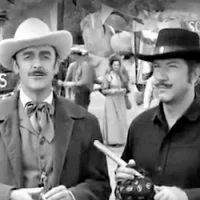
[Below: Paladin’s iconic business card]
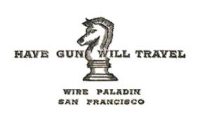
{This episode aired on a Sunday, which meant the neighborhood gang would gather at the nearby newsstand the next day after school, the winter holiday break now over. They were in luck when they spotted some of their favorite SF magazines just begging to be taken home. Astounding SF (1930-present, now Analog) was an instant selection and had been for years, but the easily recognizable Kelly Freas cover was the icing on the cake with this issue. That said, the gang was in for a couple of pleasant surprises when it saw who some of the fiction contributors were. Close friends Gordon R. Dickson and Poul Anderson had stories in this issue, and the (then) husband and wife team of Robert and Barbara Silverberg collaborated on a novelette (“Deadlock”). ASF was a monthly in 1959. The Magazine of Fantasy & Science Fiction (1949-present) would celebrate its 10th anniversary in October of 1959 and had quickly found a home with a growing readership due to its balance between classic reprints and new stories, and its willingness to showcase SF & F with different themes and a more literary approach to the story telling. Fans loved it. The issue below featured a short novel by Fritz Leiber, “The Silver Eggheads,” which is one of my favorite satirical tales by the late, great, Leiber. Ballantine Books under its Del Rey imprint published it as a paperback novel in 1961. F&SF was also on a monthly schedule in 1959. Fantastic Universe (1953-60) saw only 69 issues during its run, but attracted many of the top names in the field before outside forces caught up with it. The issue below looks like it was a fun one, with stories by L. Sprague de Camp & Fletcher Pratt, Harry Harrison, and the Horatio Hornblower of SF A. Bertram Chandler. It managed 8 issues in 1959.}
[Left: Astounding SF, 1/59 – Center: F&SF, 1/59 – Right: Fantastic Universe, 1/59]
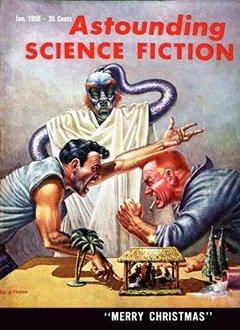
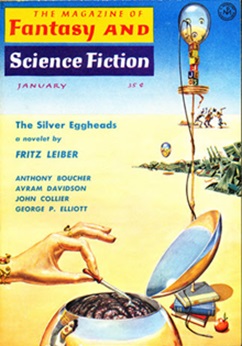
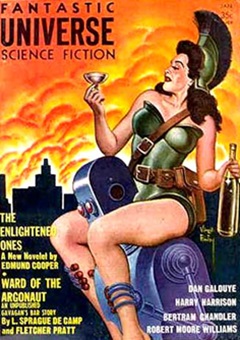
To view the entire list of weekly Old Time Radio episodes at Tangent Online, click here.